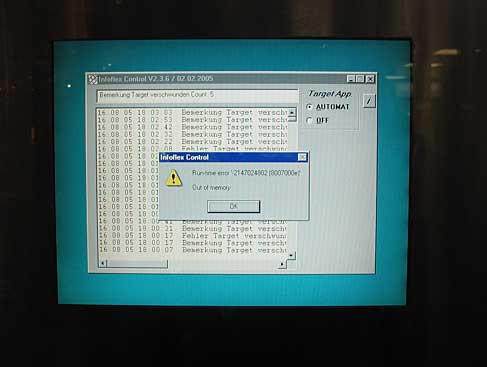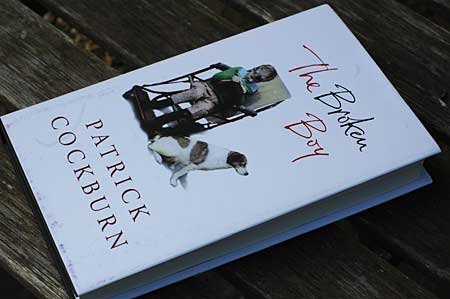
Photographed by Dale in Berne, Switzerland.


Photographed by Dale in Berne, Switzerland.
It turns out that he was in Barbados after all. I missed the coverage of Robin Cook’s funeral because we were on hols, but wondered why Blair didn’t attend. It seemed to me to be an error of judgement, not to mention a lapse of taste. And of course I laughed at John McCririck’s crack about the Prime Minister “snortling in his paid-for holiday home”. But according to the Belfast Telegraph, the Cook family asked Blair not to come because they didn’t want the funeral turning into a military and security circus. So it looks as though I was wrong — as indeed was McCririck. Nice word “snortling”, though. Must remember it.
Here’s an interesting development. According to The Register,
Amazon.com is to start selling electronic downloads of short stories, single chapters of books and even single scenes from novels as part of a new section called Amazon Shorts.
At the moment this looks like being a US-only deal, and each download will cost just 49 cents.
The idea is that readers will be able to sample new authors at very little cost, or buy updates to books they already own or to read alternative endings to favourite stories.
This is a great idea. No excessive DRM either.

Photographed outside a coach stop in Donegal.
Seeking to catch up on reading over the holidays, I took some back issues of the London Review of Books with me. I was particularly taken by “Looking for someone to kill”, one of Patrick Cockburn’s grimly realistic dispatches from Baghdad. I admire Cockburn’s journalism — he and Robert Fisk seem to me to be the best Western journalists writing about the Middle East. I’m also interested in him because I met him once or twice, and because his parents, Claud and Patricia, had been very nice to me when I was an undergraduate in Cork in the 1960s.
Later that day, we went to Donegal in search of more reading material for the kids, and wound up in the Four Masters bookshop on the Diamond, a small shop which has an interesting range of books for sale. It carries, of course, the usual beach-thrillers by Grisham etc., but also stuff (Seamus Heaney’s collected prose essays, Roy Foster’s mega-bio of WB Yeats, Andrew Marr’s lovely book on journalism etc.) which implies a discriminating and quirky owner.
Up on the top shelf I found Patrick’s autobiography, The Broken Boy.

The title comes from the fact that Patrick contracted polio at the age of six, and still bears the scars of it. (Which makes his ability to report from some of the most terrifying places on earth all the more remarkable.) So of course I reached up and took it down. The book fell open at a page showing this photograph.

I recognised it immediately as one of mine — I took it in the 1970s when visiting Claud and Patricia in their home in Youghal when I was back from Cambridge. It was lovely to see it used to such good effect, because it captures something of her remarkable spirit.
Claud was one of my heroes, and he and Patricia were immensely welcoming and tolerant of the hotheaded and opinionated would-be journalist who sought their company in the Sixties. I’ve never forgotten Claud’s advice to me when I told him I’d like to try journalism after Cambridge. “Make sure you libel someone important early in your career”, were his parting words. As a TV critic in the 1980s and 1990s, I did my best to live up to it (and enriched some lawyers as a result)!
This morning’s Observer column on the perennial mystery of why people continue using software that causes them so much grief. Sample:
When friends and family tell me their woeful stories of viruses and worms, I have learnt to bite my tongue and make sympathetic, but incoherent noises. This was not how I used to react. Once upon a time I would say, in a smugly superior way, that if people would insist on supping with the devil then they should expect to get scorched; and if they wished to get off this torture-rack then they should move to a different – Apple or Linux – platform.
But I rapidly learnt this was not what these wretches want to hear. They do not want to be told that they should abandon their Microsoft-ridden machines and worship in a different church. So in the end, I stopped telling them about Apple and Linux and began mouthing the soothing bromides favoured by vicars when dealing with terminal cases.
En passant… This religious dimension brings to mind Umberto Eco’s wonderful essay on the difference between the Apple Mac and the IBM PC, of which the nub reads…
The fact is that the world is divided between users of the Macintosh computer and users of MS-DOS compatible computers. I am firmly of the opinion that the Macintosh is Catholic and that DOS is Protestant. Indeed, the Macintosh is counter-reformist and has been influenced by the ratio studiorum of the Jesuits. It is cheerful, friendly, conciliatory; it tells the faithful how they must proceed step by step to reach — if not the kingdom of Heaven — the moment in which their document is printed. It is catechistic: The essence of revelation is dealt with via simple formulae and sumptuous icons. Everyone has a right to salvation.
DOS is Protestant, or even Calvinistic. It allows free interpretation of scripture, demands difficult personal decisions, imposes a subtle hermeneutics upon the user, and takes for granted the idea that not all can achieve salvation. To make the system work you need to interpret the program yourself: Far away from the baroque community of revelers, the user is closed within the loneliness of his own inner torment.
Wonderful post by Andrew Brown…
Marlborough College is trying to expel a boy merely for being thick and unpleasant. Perhaps you had to have been there to understand how absurd this is. It’s like being thrown out of Big Brother for being a shallow exhibitionist.
This is a school which has been hated by any pupil of any intelligence or sensibility for as long as it has existed. When I was there, the punishment for new boys thought clever was a kind of gang rape involving boot polish and sometimes sodomy with a broomstick. At the time, I would have welcomed, perhaps incredulously, any sign that the authorities thought anyone could be too stupid or too nasty for the school. Now I know better. If the school has shareholders, they should sue it at once for diluting its brand equity. Up until now, to be an Old Marlburian has made a very clear statement about a man — that he is at best a rather pious evangelical Christian, but very probably nastier, more fucked up or more stupid than even the average Anglican bishop. Should this change, no one will know what being an old Marlburian means, and the £22,000 a year that parents pay to brand their children will be entirely wasted.
I’m relieved to read this. I’ve always thought that parents who send their kids to public schools (i.e. ‘private’ schools in UK parlance) must hate them. Nice to have it confirmed.
Update: In a thoughtful comment on Andrew’s post, David Smith complains that I have “repeated the tired rubbish about children at boarding schools being hated by their parents”. Hmmm… I’m sure there are some occupational circumstances which might mean that a child is better being sent away to school, but those aside I’ve never seen the point of having children and then being separated from them in their formative years. And I’ve seen quite a few public schoolboys in my time who were clearly disliked — and in one or two cases even loathed — by their parents. Sending them away was just a socially-acceptable way of dodging parental responsibility. Or perhaps it was a way of making sure that they didn’t strangle their offspring.
… here. Now, this from Forbes.com…
Just days after a series of worms ravaged Microsoft Windows-powered networks around the world — and made high-profile splashes at media outlets including Time Warner, CNN, The Walt Disney Co., ABC News and The New York Times — several new potentially damaging weaknesses in Windows software have been exposed.
The first problem, a weakness in the company’s Internet Explorer Web-browsing software, could allow malicious hackers to crash or even take complete control of computers using the software. In order to be affected, IE users would have to visit a specially constructed Web site, but security firms say it’s still a serious threat, and that a widespread attack is likely.
Microsoft is also catching heat over a new feature that’s been included into test versions of its upcoming Windows Vista operating system. The software — currently released only to about 500,000 beta testers and software developers–apparently comes with a built-in peer-to-peer networking feature, which would allow groups of Windows computers to automatically connect without a central server. In the beta version, the software is turned on by default. That’s a violation of Microsoft’s security principles and potentially could lead to security breaches. Microsoft says the feature will be turned off in the final software release.
Nice to know that they’ve got P2P built in, though. Wonder if it’s any good?